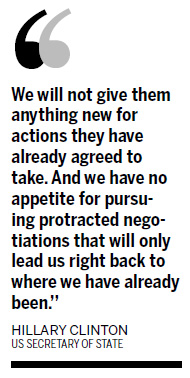Prime
DPRK official to visit US for talks
Updated: 2011-07-25 07:53
By Matthew Lee (China Daily)
|
|
Invite signals negotiations on nuke program may restart
BALI, Indonesia - Democratic People's Republic of Korea (DPRK) Vice-Foreign Minister Kim Kye-gwan will visit the United States this week to discuss the next steps needed to resume international negotiations aimed at ridding the country of its nuclear programs, US Secretary of State Hillary Clinton said on Sunday.
The announcement was a further sign that diplomats could be close to reviving Six-Party Talks that broke off in 2008.
Kim will travel to New York at Clinton's invitation, which she made after a meeting on Saturday in Bali, Indonesia, with Kim and Japanese Foreign Minister Takeaki Matsumoto.
The meeting came on the sidelines of a regional forum of the Association of Southeast Asian Nations where officials from 27 nations discussed security.
Kim will meet a team of US officials to explore his country's commitment to return to the international talks and take concrete steps toward disarmament, Clinton said in a statement issued as she was leaving Bali.
The talks involve the DPRK, the Republic of Korea (ROK) the US, China, Japan and Russia.
"We are open to talks with the DPRK, but we do not intend to reward it just for returning to the table," Clinton said in the statement.
"We will not give them anything new for actions they have already agreed to take. And we have no appetite for pursuing protracted negotiations that will only lead us right back to where we have already been."
Just two days earlier, nuclear negotiators from Pyongyang and Seoul met for the first time since disarmament talks collapsed in 2008.
The DPRK walked out to protest international criticism of a prohibited long-range rocket launch.
During Friday's meeting, the envoys from both sides agreed to work toward the resumption of the stalled talks, a significant breakthrough after more than a year of confrontation and escalating threats that have put the region on edge.
Diplomats in Washington and Asia have been eager for the two rivals to ease tensions, which spiked after two attacks that the ROK blames on the DPRK last year that killed 50.
Since the last round of talks, the DPRK has conducted a second nuclear test and revealed a uranium enrichment facility that could give it another way to make atomic bombs.
Recent DPRK threats against the ROK's conservative government include a pledge to retaliate over ROK soldiers' use of pictures of DPRK leaders for target practice.
But Pyongyang also has indicated a willingness to return to the Six-Party Talks, which have held out the incentive of badly needed aid.
It has been the ROK that has shown reluctance, demanding first that the DPRK apologize for last year's attacks before agreeing to nuclear talks.
The US has stood by the ROK, saying Seoul must be satisfied with the Pyongyang's sincerity before Washington will act.
The DPRK's reasons for returning to the talks include a need to achieve a diplomatic breakthrough and outside aid ahead of the 2012 centennial of the birth of the country's founder, Kim Il-sung.
Seoul is seen as being eager not to be blamed for leaving the disarmament talks suspended.
Analysts say the government of ROK President Lee Myung-bak may want to report progress before it leaves office in early 2013.
Associated Press

Specials

Turning up the heat
Traditional Chinese medicine using moxa, or mugwort herb, is once again becoming fashionable

Ciao, Yao
Yao Ming announced his retirement from basketball, staging an emotional end to a glorious career.

Financial sector short of talent
Lack of skilled professionals in Shanghai inhibiting the city's development as a financial hub
